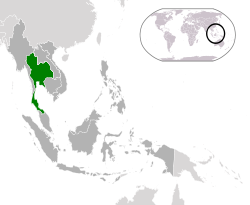Emergency And The State: Thailand’s Restive Southern Provinces – Analysis
By RSIS
The extension of Emergency Rule in Yala, Pattani and Narathiwat by the government means that the insurgency is far from over. Is there a state of emergency or an emergency within the state? It appears that only one person in Thailand may be able to solve the problem in the South.
By Antonio L Rappa
WITH MORE than 5,000 people killed and many more injured in Thailand’s three provinces of Yala, Pattani and Narathiwat, the killing of innocent Muslims and Buddhists have only added fuel to fire. The first three months of 2012 indicate that this is going to be a bloody year for the South. In the latest incident on 31 March, three more people were killed and 23 foreigners injured in Hat Yai at the Lee Gardens Plaza Hotel following an explosion activated by a vehicle-borne improvised explosive device (IED). Prime Minister Yingluck Shinawatra appears to have political control in the capital. However neither the government nor the army are likely to eradicate the insurgency in the South.
State of Emergency

Thailand’s Deputy Prime Minister General Yutthasak Sasiprapha recently approved an extension of the State of Emergency (SOE) for three more months. This would make it the 27th time that the SOE has been extended.
Weakening public security has resulted in more deaths and injuries from friendly fire, insurgent attacks by grenade launchers and handphone-activated IEDs in Yala, Ma-Yur (Pattani) and Tak Bai (Narathiwat). To add insult to injury, unknown motorcyclists in Sai Buri (Pattani) murdered a middle-aged Muslim couple. Their son, a Muslim national-security volunteer corpist, was killed the year before in 2010. More recently, more locals were killed at the Thai-Malaysian Ban Taba Moo 1 Ferry dock-pier.
Apart from considering former prime minister Abhisit Vejjajeva’s call for more funds to help the poor in the South, the public security of the nation’s four most restive provinces must be placed high on the public agenda. The Thai Cabinet must resurrect the Southern Border Provinces Administration Centre (SBPAC) or accord the commander of the Fourth Army Region, Lt-General Udomchai Thammasarojrat, more combat power. Otherwise, public security will begin to disintegrate as insurgents had recently received new supplies in their decades-old insurgency for political sovereignty.
Intelligence
Good intelligence is hard to come by and has to be carefully mined. Political scientists have long argued that the solution to the decades-old insurgency is superior intelligence. The hidden war in Thailand’s Southern provinces is an intelligence war. The Internal Security Operations Command, headquartered in Bangkok but with most of its resources based in the South, has not been able to preempt many of the insurgent attacks so far. This is because the insurgents’ intelligence cycle has not been broken. The large-scale, conventional military Counter-Insurgency Operations (COIN) in the South is not appropriate for the task at hand.
It would almost appear that some individuals are not keen on ending the war. To be sure, the insurgents themselves are pleased with the progress of their insurgency with roots that go back to the 1970s. Poor and inaccurate intelligence will lead to greater insecurity and heighten the possibilities for a new coup. After all, it seems easier to blame all problems on an incumbent government than for opponents to work with the authorities.
Only the King can resolve it
In geographical terms, the restive areas within the highest concentration of attacks constitute only a fraction of the 77,000 sq km of all the Southern provinces. Many of these successful insurgent attacks have been carried out in an area smaller than Singapore.
Since the 2004 resurgence, army intelligence should have more than sufficient data on where most attacks have occurred and ought to be able to concentrate resources towards the COIN operations. Greater army base-camp security over munitions and weapons across the country would be a good start.
There is a state of emergency in Yala, Pattani and Narathiwat. It is an emergency within the Thai nation-state itself because of the complexity of the region’s religious, linguistic and cultural traditions. Assimilationist policies had failed since the time of Marshall Phibun. They did not accommodate the religious aspirations and identity of the southern Muslims. On the other hand, pro-state Thais cannot understand why Malay-speaking Thais do not embrace Buddhist studies like other Thai citizens. This perception gap is complicated by the fact of many Thai Muslims who hold Malaysian passports and who cross the two countries joint-borders in the thousands every day.
The state of emergency in the south places the national security of the entire nation at risk. Only the King can solve the problem for good because the people often perceive him as the final arbiter of irreconcilable problems.
Antonio L Rappa is an Associate Professor and Head of Management and Security Studies at UniSIM Business School. He recently was on an RSIS workshop panel on Thai Counterterrorism and presented a paper on Thailand’s southern insurgency at the Institute for Southeast Asian Studies.
